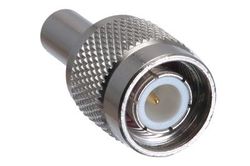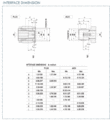TNC connector: Difference between revisions
No edit summary |
No edit summary |
||
| Line 10: | Line 10: | ||
tnc-male-crimp-connector.jpg | "Male" TNC plug | tnc-male-crimp-connector.jpg | "Male" TNC plug | ||
tnc-female-bulkhead-connector.jpg | "Female" TNC jack | tnc-female-bulkhead-connector.jpg | "Female" TNC jack | ||
tnc-interface-mechanical.gif | Mechanical | tnc-interface-mechanical.gif | Mechanical drawing | ||
</gallery> | </gallery> | ||
[[Category:Coaxial connectors]] | [[Category:Coaxial connectors]] | ||
Revision as of 22:16, 20 June 2019

The TNC (Threaded Neill–Concelman) connector is a threaded version of the BNC connector. The interface specifications for the TNC and many other connectors are referenced in MIL-STD-348. The connector has a 50Ω impedance and operates best in the 0–11 GHz frequency spectrum. It has better performance than the BNC connector at microwave frequencies. Invented in the late 1950s and named after Paul Neill of Bell Labs and Carl Concelman of Amphenol, the TNC connector has been employed in a wide range of radio and wired applications.
The abbreviation TNC is sometimes given as standing for Threaded Navy Connector. The TNC connector features a 7/16"-28 thread.
The TNC connector is seen on the External Mixer connector for Tektronix spectrum analyzers like the 2794.
-
"Male" TNC plug
-
"Female" TNC jack
-
Mechanical drawing


